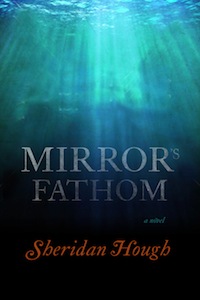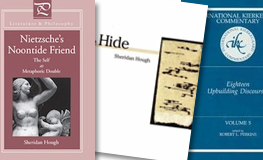
MIRROR'S FATHOM
 Advance praise for Mirror's Fathom
Advance praise for Mirror's Fathom
"Mirror's Fathom is dazzlingly multifaceted. Read this
novel for its perfectly framed plot of love, loss, and mystery. Read
this novel for its fully fleshed characters. Read this novel for its
philosophical questions on what it means to be a true individual
entangled in geography and time. Read this novel for its poetry. By
God, just read it!"
Ron Cooper, author of Purple Jesus and Hume's Fork.
"Rich and mysterious, Mirror's Fathom not only tells the story of a
missing mirror, but of the individuals who are drawn into the mirror's
ultimate fate. Hough is a master of dialogue and description, peeling
back the psyche of her characters to expose their hopes, loves, and
fears."
Erik Calonius, former London correspondent for the Wall Street Journal.
"Mirror's Fathom is a Kierkegaardian novel in more ways than one as the fictional grand-nephew of the graet Danish philosopher becomes schooled in what it means to have a vocation and become a self under the aegis of Governance in this dark but strangely uplifting tale. Beautifully executed, it is true to the spirit of Kierkegaard's thought in every way."
Syvia Walsh, scholar in residence, Stetson University
"Sheridan Hough has written an elegant, beguiling, moving and extremely intelligent book with Mirror's Fathom. Part mystery and part love story, part history and part philosophy, this is a compelling and rewarding read."
Bret Lott, New York Times bestselling author of thirteen books, most recently the novel Dead Low Tide
"Mirror’s Fathom is a very impressive first novel. Hough handles very well a variety of situations and interesting characters. The novel moves intricately between two time frames—Malta in 2009 and Copenhagen then Malta in 1898. The Copenhagen setting allows Hough to develop complex social scenes framing the character of the hero, a nephew of Kierkegaard who refuses to read his illustrious uncle, and is ironically tormented by people who assume he is a devotee. The heroines show off one another in various stages of love. And the Malta setting presents the aftermath of what we gradually piece out as the recasting of Tycho’s adventure to procure a mirror, the brilliant Kierkegaardian central thematic figure in the novel. For Hough the mirror retains all its deceptive qualities so beloved by contemporary writers. But it matters more that the Kierkegaardian mirror is capable also of conferring and confirming identities that our characters desperately need, precisely because they are caught up so thoroughly in these social settings. Yet the ultimate story trades on misidentification. The last forty pages delightfully recast what we know are the events into the mythology that still lives in the Malta scenes. Here Hough also takes on another identity–the author who delights in the play of reconfiguring the real into a story space that people will buy into. Staid Copenhagen ultimately assumes powers to remake history that eventually pervade the romance historical interweavings of Maltese life. And Hough shows she is master of the various kinds of writing required to make both worlds convincing, and yet needing the last twist of the knife where fictiveness reigns supreme."
Charles Altieri, Rachael Anderson Stageberg Endowed Chair, University of California at Berkeley
From the dustjacket
Mirror’s Fathom is the story of Tycho Wilhelm Lund—anarchist, pirate, and thief of a legendary mirror. Tycho is also a great-nephew of the Danish philosopher Søren Kierkegaard and is, when the novel begins, a mild-mannered antiques dealer who is asked to assess the value of some furniture at the home of Regine Schlegel, Kierkegaard’s famously jilted former love. Upon his arrival, Tycho—who has no interest in philosophy—finds himself at a meeting of the Kierkegaard Circle, a group faithfully reading aloud Kierkegaard’s works. There he meets, and falls for, Countess Juliana Sophie, herself a passionate follower of Kierkegaard’s thinking and self-appointed mistress of the “School for Selves.” Count Viggo, Juliana’s father, approves of their marriage, with one condition—Tycho must first lend him his expertise in antique hunting, and go to London to retrieve a family heirloom, a 6-foot-tall silver-framed mirror.
The novel moves back and forth between the nineteenth and twenty-first centuries. The action begins in Malta in 2009, where we find an anxious Maltese housewife, Rowena, desperately exercising in front of the count’s mirror. Mysteries emerge—how did the mirror get to Malta in the first place, and why is Tycho remembered there as the fearsome “Brigand Tycho"? The fates of Tycho and Rowena are tangled in a curious way, and the novel follows their stories between the two centuries, each chapter happening in the same setting (111 years apart). It is a love story, a mystery, an exploration of Kierkegaard’s philosophical claims about how a human self is forged, and why it is that “temporality, finitude is what it is all about."
Mercer University Press Fall 2012 Catalogue description.
